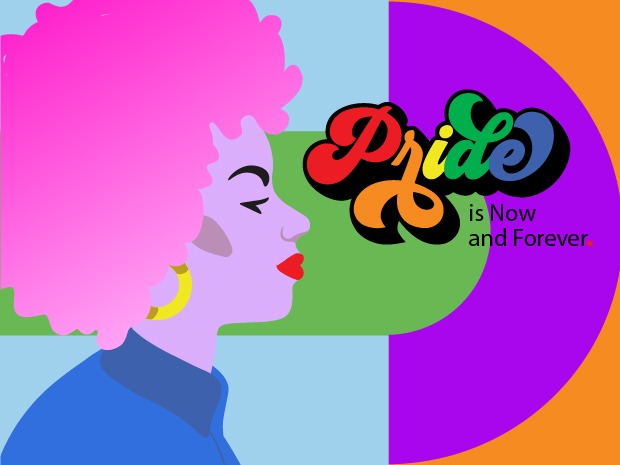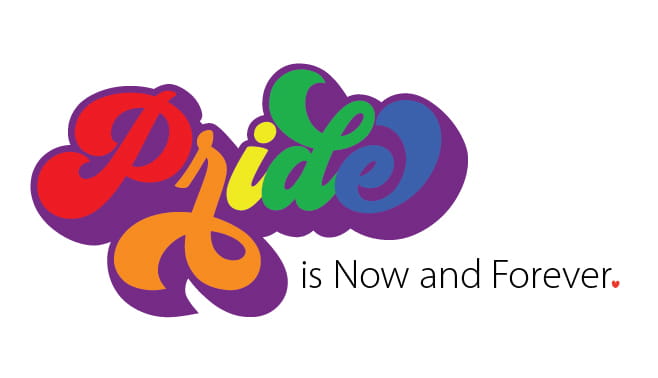Celebrating Pride with Mel Rivero
June 23, 2025
Home > About > News & Media > Story Center
A charity bike ride across Portland’s bridges and a chat with a friend during the ride brought Mel Rivero to Legacy in 2012. Our mission, our people and her ability to reach others have kept the IS applications director here during the past 13 years.
“I don’t take for granted the opportunity I have as a leader to make a difference beyond my role,” she said. “It lets me be my whole person at work. I’m able to do so much and I love that.”
Mel stepped down as chair/co-chair of Legacy’s Pride Employee Resource Group in 2023. She recently spoke with us about Pride month, her ability to be herself at work and how others at Legacy can show their support during this time of celebration.

How do you feel about being LGBTQ at Legacy?
It is the first job where I consciously decided to bring my full self to work. And it has been incredibly liberating, to connect authentically has not only improved my personal well-being but has also, I believe, made me a more present and effective leader.
As a leader within Legacy, I recognize the profound opportunity and responsibility I have. I am deeply committed to ensuring that every single person who walks through our doors feels that same sense of safety and belonging.
It also means unwavering enforcement of our policies. Legacy has clear anti-discrimination policies, and as leaders, it is our duty to uphold them without exception. If we want to be the safest place to give and receive care, that truly means for everyone. It means that a trans patient should never fear misgendering, that a lesbian couple should feel equally respected as their heterosexual counterparts, and that an LGBTQ team member should feel secure and supported in their workplace.
This isn't just about "being PNW nice" or "doing the right thing", it's fundamental to our mission of providing exceptional care. Legacy has given me the gift of being my authentic self at work, and I am dedicated to extending that gift. Do we have work to do? Yes. And we are doing that work.
Do you feel you can be your "true self" right now, given everything going politically?
This question stirs a familiar ache in my chest that has been a constant companion throughout my life in the United States. I arrived here as a child, an immigrant swept into a new world, and the Pacific Northwest became my home. I built a life, found my community, and eventually embraced my identity as an LGBTQ person. Yet, even after decades, even now, I still feel the need to "watch my Ps and Qs."
It's a strange sensation. Perhaps I’ve been in two closets. I’m not American. I’m a lesbian. I speak without an accent; I understand the cultural nuances. Yet there’s always a part of me that remains an outsider, perpetually aware of the precariousness that comes with my layered identities.
For so long, the "watching" was about assimilation. It was about not drawing attention to my immigrant roots, about perfecting my English, about understanding unspoken social rules to avoid being seen as "other." There was a quiet fear that my presence here, though longstanding, was once contingent on a piece of paper. That fear, though often subconscious now, leaves a lasting imprint. It taught me to observe, to adapt, to minimize any perceived deviation from the norm.
Then came the journey of understanding and accepting my LGBTQ identity. This added another layer to the vigilance. In some spaces, the "watching" became about assessing safety. Even in Portland and seemingly inclusive spaces, the feeling persists. It's not always overt discrimination; often, it’s the constant awareness of not being accepted.
The dream of America, for many immigrants like me, is one of freedom and belonging. And to a large extent, I have found both. But the immigrant experience, coupled with the LGBTQ journey, often means that true, unburdened ease remains elusive. It’s a quiet background hum, a subtle tension that reminds me that while I am here, and this is home, a part of me is always, subtly, watching my Ps and Qs. It’s a habit born of necessity, a lifelong lesson in self-preservation, and a testament to the complex realities of living at the intersection of multiple identities in a country that is still, for many of us, a work in progress.
This is the oldest ERG at Legacy. What direction would you like to see the ERG in the future?
I envision the ERG evolving into a more community-centered and grassroots-driven force for change. While Portland Pride is an incredible celebration of visibility, our reach shouldn't stop there. Smaller towns and underserved communities could greatly benefit from our presence, advocacy and support. Expanding our engagement to youth councils would allow us to invest in the next generation, offering leadership, mentorship and guidance to those who need it most.
By strengthening our local involvement, we can build meaningful connections that go beyond a single annual event. Whether it's organizing volunteer initiatives, hosting workshops or partnering with community organizations, we have an opportunity to foster lasting impact. Our ERG can lead by example, showing up not just in high-profile spaces but within the heart of communities that need us.
I’d love to see us cultivate a movement that feels organic and deeply rooted, where our visibility extends into mentorship, local activism and meaningful engagement. Let’s be the change from within.
What does your Pride ERG membership represent/mean to you?
My Pride ERG membership represents a deep commitment to visibility, advocacy, and meaningful change. For five years I served as chair and co-chair in my sixth and final year. I witnessed and contributed to incredible growth…not just in numbers but in the impact we’ve made. Doubling our membership was only the beginning; we redefined our identity, expanded our reach and ensured that our presence extended beyond traditional Pride celebrations into smaller communities that need us just as much.
Virtualizing our meetings and championing accessibility ensured that every voice could be heard, regardless of your position. Setting annual goals turned our passion into action, and our collaborations with other ERGs reinforced a powerful sense of solidarity across all identities. Being part of drafting policies, from transgender employee transition to anti-racism, diversity, equity and inclusion, was not just about policy changes; it was about laying the groundwork for those that come behind us to feel seen, respected and valued.
This ERG is more than a social space. It’s about showing up, advocating and shaping a workplace and community that reflects the dignity and equity we all deserve. Being part of this journey has meant standing for something bigger than myself and working alongside others to ensure our presence is not just acknowledged but felt in every corner of our community. I am proud to be part of that legacy.
Legacy’s theme for Pride is “Pride is Now and Forever.” What does that mean to you, especially given what is going on in our country?
It’s heavy, both a call to action and a promise. The fight for equality is ongoing, and there are places, even close to home, where fear and discrimination still shape daily lives.
Health care should be a place of refuge, not a place where someone has to question if they will be respected for who they are. We have the power to ensure that no one feels alone, and that their identity is affirmed, honored and protected.
We also cannot forget the history that brought us here. The rights we hold today were won through generations of resilience and sacrifice. Too many have lost their lives simply for existing as their true selves, and we cannot allow even an inch of that progress to be undone.
What can your Legacy colleagues do to show their support for Pride?
Supporting Pride isn’t just about celebration, it’s about taking active steps to create a workplace and community where everyone feels safe, seen and valued.
Join the ERG! Being part of the Employee Resource Group means standing in solidarity, contributing ideas, and helping drive initiatives that foster inclusivity and change.
Cultivate a culture of safety:
- Honor the identities of your coworkers. Respect names, pronouns and lived experiences. Creating a space where people can be their authentic selves makes all the difference.
- Make your pronouns visible. Whether it’s adding them to your contact information, signature line or wearing a pronoun button, visibility normalizes conversations around gender identity and makes it easier for others to feel seen and respected.
- Speak up. If you witness discrimination or microaggressions, submit an ICARE.
Where do you go in your community to draw strength or solace?
I find strength and solace in the quiet yet powerful spaces within my community, the places where passion, care and connection take root and thrive. There are businesses/organizations in my small town of Camas that have built safe spaces for all, reminding me that inclusivity and compassion are not just ideals but active, living commitments. Seeing my neighbors show up with dedication and purpose reassures me that change starts close to home.
And, as simple as it sounds, my community garden is a source of peace and reflection. Watching tiny seeds transform into something strong and vibrant is a humbling reminder that growth takes time, care, nourishment and action.
Health care should be a place of refuge, not a place where someone has to question if they will be respected for who they are. We have the power to ensure that no one feels alone, and that their identity is affirmed, honored and protected.
![]()


